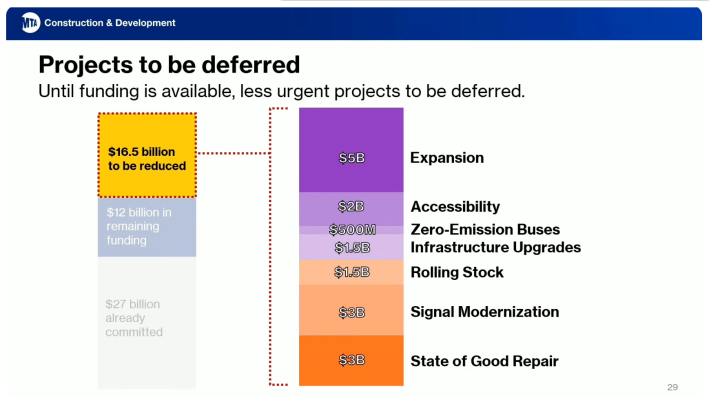The MTA's board issued a bureaucratic rebuke to Governor Kathy Hochul's congestion pricing pause on Wednesday afternoon, by voting in favor of a resolution that called on the transit agency to implement the tolling plan as soon as Governor Hochul stops holding it hostage.
New Yorkers would not be wrong to read the dry, legalistic language of the resolution as a supposedly independent board overseeing a public authority caving to a nakedly political decision made by the governor.
But multiple members of the board—who are appointed variously by the governor, the mayor, unions, and suburban counties—insisted that the measure was yet another affirmation that congestion pricing will happen, and distanced themselves from the governor's actions.
"I want to make it clear that a 'yes' vote on this resolution is not an endorsement of the congestion pricing pause, but rather a confirmation that the MTA is eagerly awaiting to implement the program as soon as the tolling contract is signed by all parties involved," board member Blanca López said in a statement affirming her "yes" vote. "Decisions have consequences. Abrupt decisions taken, such as this pause, cause turmoil and fear."
David Jones, an MTA board member who also leads the Community Service Society, criticized the governor's bogus invocation of poor and middle-class New Yorkers as a justification for stopping congestion pricing, though he didn't mention Hochul by name.
"There's virtually no impact among the working poor," Jones said of the $15 tolls that would have been paid by drivers entering Manhattan below 60th Street during rush hour starting on June 30, had the governor not intervened. "I don't want them to be the issue—oh you're hurting the working poor. There is no evidence that it does."
Before Wednesday's board meeting, which was the first since Hochul announced the pause on June 5, the governor's office reached out to MTA board members appointed by her office and asked them to read general statements of support for her office, but none did, according to one board member who asked to remain anonymous to speak freely to Hell Gate.
"I thought the board members spoke their mind," the board member said after the meeting. "Two or three board members spoke about how Albany needs to find a 'creative solution,' which felt like a direct reaction to a quote [from the governor] about the need for 'imagination' on the part of the MTA."
Board member Norman Brown, a machinist appointed by a Metro-North riders council, came the closest to criticizing Hochul directly, calling her decision "political interference" and "catastrophic in many ways."
"There are a lot of people up in Kathy Hochul territory who are gonna lose their jobs because of this," Brown predicted. A Reinvent Albany report released on Wednesday morning showed that the congestion pricing pause could cost 100,000 jobs across the region.
The resolution passed 10-1, with the sole no vote coming from the same sole vote against the congestion pricing plan when it was passed back in March: board member and Long Island representative David Mack, who fell asleep during the meeting.
"Number one, I applaud the governor for postponing it," Mack said in his strange and somewhat coherent remarks once he was awake. "Yes, congestion in that area—and I travel it. I have many friends. But there's absolutely no enforcement of the parking regulations, the bike lanes. Just coming here today, they just go right through the red lights. No one cares."
In a statement sent out shortly after the board's vote, Governor Hochul insisted that she has always been a friend to the MTA, and that no projects would be harmed by deferring the $15 billion in bonds the MTA was relying on from congestion pricing (the words "congestion pricing" were absent from the statement altogether). Hochul also all but admitted that the state legislature—which has expressed no real ideas for alternative methods of funding the MTA—was not going to meet again this year to figure out where this $15 billion would come from.
"While the timing of the next budget may necessitate temporary adjustments to the timeline of certain contracts, there is no reason for New Yorkers to be concerned that any planned projects will not be delivered," Hochul said in the statement. "In the interim, the MTA has committed to direct all available resources to ensure the system remains in a state of good repair and continue to advance priority projects, and prepare to activate new contracts immediately following the designation of new revenue sources in next year's budget."
But the MTA had a very different message for the board: A variety of vital projects totaling $16.5 billion would need to be deferred, including $3 billion to modernize the A/C and B/D/F/M lines, $3 billion in station renewals and repairs, $2 billion in accessibility improvements that affect 23 stations, and $5 billion to expand the Second Avenue subway.
Help us keep you abreast of congestion pricing: Tip us!
Also on the chopping block: $1.5 billion in upgrades to the Verrazzano-Narrows Bridge. Specifically, a dehumidification project to slow down the erosion of the main cable of the bridge.
"This means that drivers in Staten Island and Brooklyn will be impacted," board member Midori Valdivia pointed out.

MTA CEO and board chair Janno Lieber said that "the accessibility impacts break my heart, but we can make sure that they are ready to go when the funding shows up." Lieber also said that the MTA can "keep the machinery of congestion pricing in operating order when the temporary pause is lifted."
But at a press conference after the meeting, Lieber declined to talk about the contradiction of the MTA's presentation with the governor's assurance to New Yorkers that no MTA projects would be meaningfully affected. "I do very much take her at her word," Lieber said.
While many of the 140 New Yorkers who signed up to speak during the public comment section (an MTA record) asked the agency to "flip the switch" and just go ahead with congestion pricing anyway, Lieber and several board members explained that their hands were tied, because they could not direct the governor to force her DOT commissioner to sign the Federal Highway Administration/U.S. DOT's Value Pricing Pilot Program agreement, a formerly ministerial step that Hochul is now using as the linchpin of her pause.
"The decisions on this stuff are gonna be settled by a courtroom of lawyers," Brown said, referring to an effort by Comptroller Brad Lander and environmental and transit advocates to sue to force the enactment of congestion pricing. "I think it's a horrible way to make these decisions."




